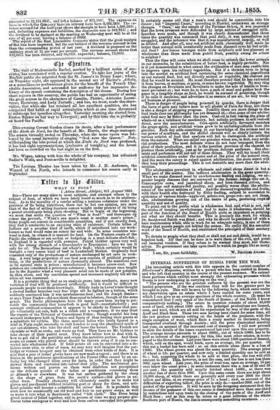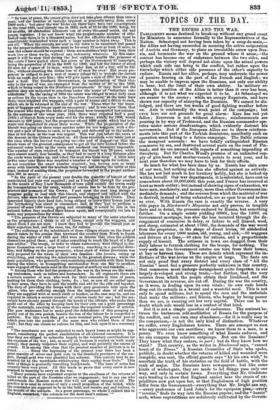INTERNAL SUFFERINGS OF RUSSIA FROM THE WAR. - [An interesting
article with this title appears in the current number of', Blackwood's Magazine, written by a person who has long resided in Russia, and who left that country in the course of the present summer. We extract those portions which exhibit most strongly the exhausting processes which Russia is now undergoing in carrying on the war.] .
"The persons who are the greatest sufferers by the present war are the landed proprietors. If the war continue they will for the greater part be brought to ruin. This will be seen by the following facts, which came under my observation upon an estate where I have resided for some years, and which I can give as an average specimen of the whole country. (It must be remembered that I only speak of the South of Russia ; of the North I know comparatively nothing.) The estate in question consists of about 40,000 acres of land, with about 1300 serfs. Its principal productions are linseed, corn, and wool, which are all sold for exportation by way of the ports of the Azoff and Black Seas. These two seas having been closed for some time, all the raw produce remains rotting on the hands of the producer, with the single exception of wool, which finds a ready market in Germany, being transported overland through Austria ; still the price diminished sensibly last year, on account of the increased cost of transport. I will now proceed to state the details of the losses experienced last year upon this one property. The average income amounts to about 60001., out of which 15001. has to be paid as interest of the mortgage; for this, like most other estates, is mort- gaged to the Government. Last year there were about 1600 quarters of linseed, which, sold on the spot, would fetch, upon an average, 16s. per quarter. Of this not a bushel has been sold : so on this article alone there is a loss of 12001. The wheat grown was about the same quantity. The average price of wheat is 12s. per quarter, and now only a limited quantity can be sold at 88.; but, supposing the whole to be sold at that price, the loss will still amount to 300/. This, however, is not the case, and the loss is not leas than 5001. upon wheat. Last year, the price of wool was, upon an average, 16 per cent below the usual price ; in some instances there was a loss of 20 and 26 . per cent, the quantity sold usually fetched about 14001., so there was another loss of more than 200/. Upon this same estate there are kept about 18,000 sheep, of which there are generally sold every year 2000 for their tallow and skins, at an average price of 78. a head ; now, on account of the difficulties of exporting tallow, the price is only 58.—another 200/. out of the pocket of the proprietor. It will be seen by the foregoing statement that the income of the possessor of this one estate is diminished more than one-third by restrictions laid upon trade by the closing of the ports of the Azoff and Black Seas ; and as this may be taken as a good criterion of the whole
Southern part of Russia, the loss is consequently something enormous -- -"In' time Of peace, the tonseriptiOn does not hike plaice Oftener than once a ear, arid the Memb its
er Of recruits- required is'generallyaeveri from every 1000 serfs .;• but since the-War- broke oot there-hive been twii cOnscriptions in the yeit.11354,•andiliteady-One in 1855, each Of 12 itteti1000,'being, for 'Sheathe, -36-abiebodied 'labourers out of evety-thouSand'aiiiles, 'Old and yoinig-togethet: 1.de not knew 'what' the proportionate, taimber of able- bodied me:is-there is in a- thousandinales, but the effectivestreogth.mnst be considerabirdiminialied when Such large is 'taken away. This is not ell: When the recruits are sent to the 'town tube examined and passed by thepropertmtherities' there host be for every 12'mert tit least 18 more, in Case the Otherirshotild herejeeted ; these areeometihes'kePtitwav'from their work two or three weeks, without env indemnity whatever. By this state- ment it Will be seen that diiringAhe -last eighteen ruerithil the possessor of the estate I have quoted above has given to the.GOVerineelit 47 conscripts, being the proportion' of SG in the 1000 for 1300, end !oat' tlielebour of about 70 men for a spiteeol 14 days, which latter Ws; at 6//..a day; will be 241: 108., without 'Oetinting the entire less of 47 hen for'eVer.'• •Ildt every pro- prietor is obligati" pay -a sum of -money (about -8(.) to Iiievitle the recruit with an outfit and arm this will give again a stint 61'3761. for theyear and a half. The Southern Governhents,- in consideration- -Of their_ vici- nity to the seat of Vier are.'ekeinpted'froin the Militia' bf ' 80 in the 1000, which iibehigvai4ed in the Northern 4ov-elements.' .1f; 'they have not the militia they'are-ablijected tomiactions'under the nerne'of -*Veltintary Con.;. tribtitietts.' 44-theepring of 1864 the estate wasebligedleiend-forty oxen as rations for the troops_ then in the Danubian Froviricee'rittlie Same time theieviereltiqiiired fire waggons; with a phi 'Of lietseiend'iftlriVer to each, Which are tote teterned at the-end of the wet. These 'veie:.ie few the trans- port of haggageaiid troops untilr an emergency; -and it ivits•upeir theta that the armies who fought the battle of Inkerman were transported last autumn. In theiiiittinta of:tbe same _year, 1854, there were •required half a pood (181b.) -Of biscuit from every male serf for the army, for 1100; would amount to 660 Pbeds ; but the proprietor offered 1000 pbedi, Which had to be made and despatched in about; three weeks. While thelirepOrittion of the biscuit was going on there came another order for -ten iiaggeni;-. with a dri- ver and a pair of horses tcreach,.tO be ready iind delivered :of to the anther- ities inten.days, as the case was urgent. This was jusit,fore the news of the descent in-the Crimea reached us. All these exactiO4a,wthe Made just at the time when the harvest was going -on—the end of 'August—so that the hands were of the greatest consequence to get all the can beitsedbefore the autumnal rains broke tip the roads and rendered ,the' transport impossible. The number or oxen required'- to transport the biectlit Wier Pairs, which Were absent nearly four months, as they had to cerrYitloagr'distance after the roads vvere.broken up, and When the mud was linee,deep: later little Smile yearthero was required a-number of ekeifitgam lei-tan:ens. I do not remember the exact number required ; butt having sent So many away with bisenits; and the inurtain.being•VetY bedhniffiethe'eattle at this time, instead of sending them, the proprietor forwarded-totte proper author-
ities ities 901. in Money. . . , . "In the April of the present year double the quantity' of biscuit of that contributed last year was required; and as I travelled ihrengli the country in the month of May I saw thousands of tons 'piled outside the towns ready for traospOrtationio the army, which of course has to be done by thepro- prietortrandpeasants of the Crown. I met upon the road long strings of waggons going to load with this biscuit, and - stopped and talked with the drivers, Who were for the chief Part peasants belongnig to the Crown. They lamented bitterly their hard fate, being obliged to leaveleit homes just as the 'haYinakilig was about to commence; and; as they' had to: perform a journey of some 1500 versts, -going and returnnig, it would be late in the autumn before they reached their homes again, and consequently too late to make any preparations for -winter.
"The peasants of the CTOWII are subjected to many of the same exactions as the proprietors—I think to all of them, except only the Waggons, and about them I am net sine. I know they had to previde the biscuit just as
their superiors had, and the oxen, too, for rations: .
"The sufferings of the inhabitants of those villages situate on the lines of March taken by the titmice that traversed the countrt from NOrth to South dining the winter of 1863 and 1854 were so intense that .even the soldiers themselves pitied there; and it takes something to touch the heart of a Rus- sian soldier. The troops, in order to obtain sustenance, Were obliged to dis- perse themselves over a large tract of country, marching in a parallel direc- tion, and falling on the poor peasantry, whose stock of winter provisions was only prepared for the wants of their own families: _like locusts, eating up everything', and reducing the inhabitants to the greatest ,distreas ; while the male population, who generally earn something considerable With their horses daring the winter, in transporting merchandise from oat fitir to another,
were engaged off the main road in the transport of artillery-and tumbrils '" Amongthose who feel the pressure of the war in the towns are the work- rig tradesmen; such as tailors and bootmakers. In all regiments there are a certain number of men who work for their comrades in time of peace, making for them their clothing, boots, &c. ; but, as now all are called upon to bear arms, they have to quit the needle and awl for the rifle and bayonet. The duty of providing the troops with their grey greatcoats fella 'upon the idlers, who are suffering enough from the depressed state of all trades. They are supplied with so much cloth or leather, as the case may be, and are required to return -a certain number of articles ready for use ; but the ma- terials have already passed through the hands of the officials, who make their profit out of the affair by keeping back for their own use a good percentage of the materials, exacting at the same time the required number of articles. The poor tradesman has to make good the defalcations of this grasping ra- pacity out of its own pocket, besides the loss of the labour he is compelled to perform. For this work they get a mere nominal price the greater part of which goes into the pockets of the same men who robbed them of their cloth ; but they can obtain no redress for this, and look upon it as a necessary evil.
"The merchants are not subjected to such heavy losses as might be BUR- posed, considering the perfect annihilation of all external commerce. It is true they are obliged to subscribe largely to the voluntary contributions for the expenses of the war ; but, as nearly all business is carried on with ready money, they merely withdraw their capital, and wait patiently the course of events. It is among this class that the greatest number of patriots is to be
found Since the beginning of the present year there has been a great scarcity of silver and gold coin in the Southern provinces of the em- pire, though gold was very plentiful last autumn. This scarcity may be ac- counted for by the memhants withdrawing their capital from trade." This state of things is gradually travelling Northwards. 'The issue of notes has • recently been very great. All this tends to prove that every sinew is now strained to bursting to carry on the war.
"Many persons have expressed surprise at the smallness of the returns of killed on the part of the Russians after an engagement ; but to any one who understauds the Russian system this will not appear strange at all. The practice is to send in returns of only a small proportion of the killed, while the remainder are supposed to be in the field, and receive pay and rations to the benefitof the ftlonels. As a great personage, to whom I related this in England,remked, 'the colonels eat the dead men's rations. "



























 Previous page
Previous page